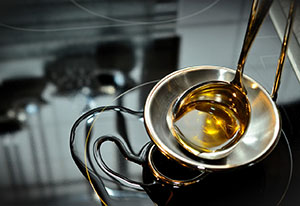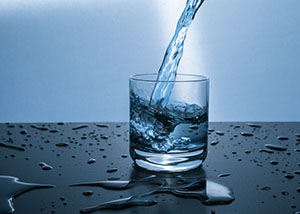
Everyday Chemicals Are Screwing Up Your Testosterone
You may have already read my other article on 7 habits which are killing your testosterone. There was a section in that on Water because

The following 9 common mistakes are detrimental to testosterone, lowering it by upwards of 25% which in some cases is enough to put you below prescription levels!
Chances are you are making at least 5 of these mistakes. Read on to find out what you can quickly change in order to maximize your T levels.

Vegetable oils include both actual vegetables and grains, can wreak havoc on your testosterone.
Not counted in vegetable oils is cold pressed extra virgin olive oil, coconut oil, avocado oil, and palm oil which may have many health benefits including increasing testosterone levels.
The extraction of vegetable oil often uses chemicals, bleaching, and deodorizing techniques which minimize any health benefits they would have had, while leaving behind sulfates.
In addition to the sulfates they tend to be extremely high in PUFA (polyunsaturated fatty-acid) which in scientific studies has been linked with lowered testosterone levels[1].
There are generally two camps with regards to healthy oils, those which primarily recommend coconut, and those which primarily recommend olive oil.
While this debate is out of the scope of this post, we do recommend you use either or both of these options in your cooking, and refrain from use of all other vegetable oils when possible.
Note: Cold Press Extra Virgin Olive Oil did make our list of the Best Natural Testosterone Boosters.
Testosterone levels rise as we sleep and decrease during waking hours[2]. In order to maximize your natural testosterone production, you need to get adequate Z’s.
A recent clinical study of healthy men[3] showed just one week of decreased sleep caused a drastic reduction in the subjects’ testosterone levels.
Every man in the study experienced a significant decrease in his T, ranging from ten percent to as much as fifteen percent. Keeping everything else in their lives the same, that’s the effect which resulted just from lack of sleep.
This study discovered lack of sleep can have the same devastating effects on testosterone levels as aging 10 – 15 years!
It will probably come as no surprise to you that T levels usually dip the lowest in the afternoon and evening hours since you are most likely to feel an energy crash around the same time.
Unfortunately, that’s probably when you probably want your energy and libido to be geared up! If you are already running at a deficit due to lack of sleep, the testosterone crash is going to hit you that much harder.
Need help improving your sleep? Check out our 5 tips on better sleep.

You already know stress and anxiety take a toll on your body and overall health, but you probably didn’t know it also has a seriously bad effect on your testosterone levels.
There is a negative correlation between the “stress hormone” cortisone and testosterone, meaning when cortisone goes up, testosterone goes down[4].
And not only is cortisone linked to your testosterone levels but it’s impact can have a near instant affect when cortisone spikes.
Not feeling “in the mood” after a bad day? That could be cortisone taking its toll on your testosterone level with its immediate effect.
Long-term stress can be even more damaging because your body keeps up the levels of cortisone to try to deal with your stressors.
On a biological level, your body goes into “fight-or-flight” mode, and reproductive vigor is just not an immediate priority. Your body’s resources are being diverted elsewhere and you’re simply not able produce T at a maximum level.
Reducing the stress in your life or at least working on your ability to cope with that stress is a fundamental key to maximizing your testosterone production. Since the latter is much easier than the former, consider looking at supplements designed to boost your T levels such as ashwagandha.

You’ve probably heard or even witnessed the effects of a night of binge drinking on your ability to perform at your best but did you know that alcohol directly affects several of the processes necessary for testosterone production?
The fact of the matter is that tanking up on alcohol can cause your testosterone to tank!
We want to be clear, having a drink or two has not been shown to have a significant impact on testosterone. We are talking about those nights which lead to those mornings.
When your body metabolizes alcohol, the process uses up a coenzyme called NAD+, which is an essential component of testosterone production. If your body is missing essential building-blocks for the production of T, it simply can’t make more.
This is an area where the effect is directly correlated to the amount of alcohol intake, so a few drinks here and there probably won’t have much effect. But the more you drink, the lower your testosterone levels will get.
It’s worth stating again, having the occasional beer or mixed drink likely won’t do much to your T levels. But if you find yourself frequenting the good stuff, expect your testosterone production to take a severe hit.

The category of “refined carbohydrates” includes not only sugars, but also the foods that convert directly into sugars when you eat them, like white bread, white rice, and pasta.
Your body is primed to respond to the presence of sugars by releasing insulin, which is used to process the sugars.
These spikes in insulin levels is an enemy to your testosterone production.
Eating a high glycemic meal with a lot of refined carbohydrates can knock down your testosterone levels for several hours, and by a significant amount.
You can do even worse damage over time, if you make a habit of refined carbohydrate intake because your body can actually become insulin resistant.
Not only is that a condition associated with pre-diabetes, it is also associated with far lower levels of testosterone than normal.
In one recent study, published in the journal Clinical Endocrinology[5], found men saw a 25% decrease in testosterone after consuming a sugary drink. And this wasn’t just a quick dip, it lasted for 2 hours!
Even more astonishing is out of the 66 men in the study with normal testosterone levels at the start of the experiment, at least 10 saw their testosterone levels dip below the hypogonadal range.
In other words, T levels were below prescription levels meaning they may have qualified for hormone replacement therapy. That’s significant to say the least!
Healthy carbohydrates are still an important part of a balanced diet, and in fact, carbohydrates provide an essential building block for testosterone with more than one study showing a higher carb diet leads to higher testosterone levels and lower cortisone levels[6].
Other studies[7] have shown higher carbohydrate diets lead to quicker recovery times, more strength, and higher levels of protein synthesis.
It is, however, important to stay away from the refined variations and stick with the more nutritionally valuable carbs that will not spike your insulin and potentially lower your testosterone production.
One of our favorite sources is chickpeas (also known as garbanzo beans) which are extremely versatile, making foods from humus to wheat and gluten free pasta.
They are also a great source of protein, fiber, and large amounts of vitamins and minerals key to T production.

If you’re a health-conscious guy, you probably make it a point to drink a lot of water to stay hydrated and keep your body’s processes running smoothly.
There is no doubt water is essential to biological processes (including T production), but it’s critical you pay attention to the quality of the water you drink.
Your high intake of water could be the inadvertent gateway for chemicals which are damaging your testosterone levels.
A three-year study conducted by the Environmental Working Group in 2009 found a whopping 316 chemicals in tap water throughout the country.
Out of the 316 chemicals found, 202 of them are not even regulated and others didn’t pass guideline levels[8].
Want to have a look at what has been discovered in your tap water? Go to https://www.ewg.org/tapwater/
These chemicals can be severe endocrine disruptors as they may mimic, block or interfere with your body’s hormone production.
As an example, fluoride is added to the drinking water of 75% of Americans. “Fluoride could effect hormone levels of each layer of the hypothalamus-hypophysis-testis axis, and show the reproductive endocrine disturbing effects.” according to this study.
After reading that, you may think switching to bottled water is the key but companies are not required to disclose the level of contaminants in their products and some have even been found to be nothing but tap water anyway.
In addition to that, there are often times damaging chemicals such as phthalates or bisphenol-A (BPA) found in the plastic containers which can leach directly into the water.
Consider investing in a good water filter and use safe containers to store and drink from. Preferably a filter that “remineralizes” your water to replace the healthy minerals that a good filtration system will remove along with all the bad stuff.
Replenishing essential minerals in your drinking water is crucial because their absence can lead to the depletion of your body’s mineral stores. This continual loss without replacement can contribute to dehydration (and drinking more demineralized water will just dehydrate you further) and necessitate additional supplements to compensate for the deficiencies.
If a remineralization filter is not an option for you, consider adding 1/8 teaspoon of Celtic or Himalayan salt to a glass of water once or twice a day. These two salt variations contain around 80 different minerals including magnesium and zinc, both of which are crucial to optimizing your hormone profile.

We all know that being overweight comes with a plethora of health risks. One of those risks for men is drastically reduced testosterone levels!
Body fat contains aromatase, an adrenal enzyme that converts androstenedione and estrone to estrogen.
What does that mean exactly?
The more body fat you have, the more of your testosterone is getting turned into estrogen!
Another problem is testosterone is a fat-soluble hormone, meaning that it can get stored in fat tissues. Instead of being free in your body and your bloodstream, testosterone may be getting locked up inside your fat, decreasing your free testosterone levels.
We have some good news for you though. Testosterone plays a critical role in your body’s metabolism, so as you start to shred the excess pounds and your T levels increase, it will get increasingly easier to burn off more of the fat. That’s a double win if we’ve ever heard of one.
See our article on the best natural testosterone boosters.

Animal products can provide many of the essential building-blocks needed for testosterone production such as zinc, but if you chose the wrong meat you may be doing more harm than good.
Most people are aware that eating pesticides is bad for your health and can damage and/or weaken multiple bodily functions like testosterone production.
But what most people don’t think about is how many pesticides are in the meat they are eating!
There is little to no regulation on how much pesticide can be sprayed onto the grains of animals meant for slaughter.
These pesticides can be absorbed into the fat of the animals or the milk of dairy cows which you then consume.
In addition to the potential dangers of pesticides, animals raised in factory farm conditions may have unnatural levels of hormones, especially estrogen [9], in their meat, milk, and eggs.
To help maximize your natural testosterone levels, look for organic, and when possible grass-fed and/or pastured animal based products.
Ok, ok, this is a pretty cheeky plug but the thing is we honestly believe this. Force X7 was created with healthy doses of 13 scientifically case studied vitamins, herbs and minerals.
We also stayed away from the overhyped “popular” market ingredients that have never actually been proven to increase testosterone such as fenugreek or D-Aspartic Acid.
The full truth is there is no such thing as a 100% natural supplement that can help increase your T levels without you also putting in work, such as following the first 8 steps in this list.
However, supplementation can most certainly help you take things to a whole new level and Force X7 is the right place to start.
References:

You may have already read my other article on 7 habits which are killing your testosterone. There was a section in that on Water because

Rhodiola Rosea stands out as a potent adaptogenic herb with a rich history of traditional use and a growing body of scientific research. Revered for

In this comprehensive article, we will explore what L-tyrosine is, its benefits as a pre-workout supplement, the correct dosage, and other potential health benefits it

Betaine anhydrous is becoming an increasingly popular ingredient for pre-workouts. In this article, we will explore the fundamentals of betaine anhydrous, its connection to carnosine,

Beta-alanine is a pre-workout powerhouse. From boosting workout performance to potential anti-aging effects, discover why this amino acid is a favorite among health buffs.

You may have already read my other article on 7 habits which are killing your testosterone. There was a section in that on Water because

Rhodiola Rosea stands out as a potent adaptogenic herb with a rich history of traditional use and a growing body of scientific research. Revered for

In this comprehensive article, we will explore what L-tyrosine is, its benefits as a pre-workout supplement, the correct dosage, and other potential health benefits it
Discount Applied Successfully!
Your savings have been added to the cart.